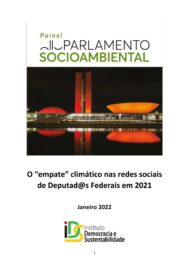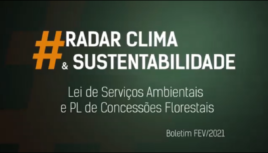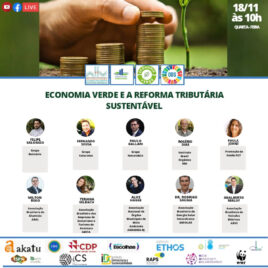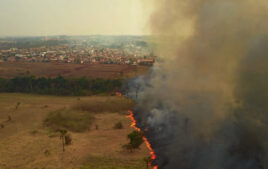03/11/2014
por Daniela Ades (Comunicação IDS)/ Texto original: Fabio de Almeida Pinto (IDS) e Roland Widmer (WRI)
A transição econômica rumo a um modelo de desenvolvimento que tenha a sustentabilidade como valor central é tema de importantes discussões entre as diversas organizações da sociedade civil, governos e setor privado. Neste contexto, o financiamento de atividades que promovam a economia de baixo carbono é elemento fundamental, dado seu poder de impacto transversal em todos os setores da cadeia de atividades produtivas e de serviços.

A partir desse cenário, o World Resources Institute (WRI) realizou uma oficina no Brasil para abordar os desafios e propor soluções para dar maior escala ao financiamento climático, que resultou em artigo escrito por Roland Widmer, consultor do WRI, e Fabio de Almeida Pinto, coordenador do IDS , intitulado "4 Keys to Scaled-up Climate Investment in Brazil".
O texto destaca o momento preocupante que o Brasil vive em relação às emissões de gases de efeito estufa, apresentando aumento da intensidade de emissões por unidade do PIB, enquanto a maior parte dos países do G20 tem apresentado redução neste indicador. O caso brasileiro é particularmente mais grave dada a expectativa de mais investimentos em infraestrutura para apoiar o esperado crescimento econômico e a inclusão social.
Segundo a organização internacional, em muitos países, incluindo o Brasil, políticas de incentivo fiscal e econômico têm privilegiado investimentos não sustentáveis. A baixa escala em que projetos sustentáveis são financiados e seu usual elevado tempo de maturação, os tornam menos atrativos a instituições financeiras e investidores que adotam modelos de avaliação de risco tradicionais e focam seus resultados no curto prazo.
Durante o encontro do WRI, discutiu-se como instrumentos financeiros inovadores podem tornar os investimentos amigáveis ao clima mais competitivos e menos arriscados, mesmo em condições adversas do mercado.
São destacados quatro passos essenciais que podem estimular o financiamento climático em escala no Brasil:
(a) reformas para criação de um ambiente propício para o investimento climático;
(b) remoção de barreiras não financeiras;
(c) combinação de financiamento subsidiado, recursos privados e mecanismos para mitigação de risco; e
(d) desembolso inteligente e seletivo do financiamento subsidiado, de forma a impulsionar a entrada do maior volume de financiamento privado possível.
Finalmente, o WRI afirma que os desafios financeiros do Brasil para o desenvolvimento sustentável fazem parte de uma tendência global, mas sinais de políticas adequadas aliadas à combinação certa de recursos para financiamento podem levar o país para uma economia de baixo carbono.
Confira o texto original em inglês na íntegra:
"Call it bad timing: Brazil’s greenhouse gas emissions intensity is rising while that of most of the G20 countries decreases, just as more infrastructure investment will be needed to support expected economic growth and social inclusion. Representatives of commercial banks in Brazil, the Brazilian Development Bank (BNDES), the Inter-American Development Bank (IDB), Brazil’s Ministry of Finance and others joined WRI experts to explore how they can collectively help the country make the transition to a low-carbon economy.
A WRI workshop in São Paulo on September 3rd, 2014, approached the topic of shifting and scaling up financing and investments for climate-related projects from two angles—the role of international climate finance sources and the use of innovative financial instruments. Clifford Polycarp, Deputy Director of WRI’s Sustainable Finance Program, and Artur Lacerda, Deputy Secretary for International Institutions Policy of the Brazilian Ministry of Finance, discussedopportunities presented by the Green Climate Fund and lessons learned from the Climate Investment Funds to support investments in climate-relevant activities in Brazil. Luciano Schweizer, Lead Specialist of the Capital Markets and Financial Institutions Division at the IDB, illustrated how innovative financial instruments can make climate-friendly investments more competitive and less risky, even under unsympathetic market conditions.
In many countries, including Brazil, the market may be skewed towards unsustainable investments, through economic and fiscal policy incentives. Sustainable solutions may not have reached economies of scale yet, so they are more expensive than current systems. And the investment horizon is short, so banks and project promoters can make high short-term profits on less-sustainable projects. When project developers face barriers to financing disruptive climate projects—such as unfavorable risk/return expectations — financial instruments like loan guarantees and insurance mechanisms can mitigate risks and encourage investments. International climate finance can help overcome such barriers.
Participants agreed on four key steps that could spur scaled-up climate finance in Brazil:
-
Creation of an investment climate. Clear and stable signals and are necessary to attract the private sector and build an attractive pipeline of projects, and long-term projects are attractive when aligned with a long-term strategy to tackle climate change. Beyond isolated measures, the Brazilian government should reform its fiscal policy, as well as other regulatory instruments, in order to give clear policy signals and encourage private sector investors towards sustainable, low carbon and climate-resilient development. Other challenges require international collective action, possibly by the G20 major economies, which account for 80 percent of global GDP. For instance, a new report by the G20 Climate Finance Study Group identifies numerous climate finance policy options such as regional insurance-mechanisms and measures to encourage transfers of technology internationally.
-
Removal of non-financial barriers. Non-financial barriers involve supporting technology advances, promoting business models and incubating projects, as well as organizational, operational and cultural hurdles. For instance, organizational structures and incentives traditionally focus on achieving business-as-usual goals, instead of promoting sustainable operations. Overcoming these barriers increases the competiveness of climate finance products and ultimately helps drive investments towards those that support a low carbon economy.
-
Blending of concessional money, private resources and risk mitigation instruments to overcome financial barriers. Most participants felt that development banks or public institutions should bear the higher risks of climate financing because the perceived risks associated with new solutions could discourage private financial institutions. However, a growing number of instruments such as loan guarantees, insurance mechanisms and (quasi-)equity can address those risks. As an illustration, IADB has financed successful energy and energy efficiency projects in Mexico and Colombia that attracted investors by offering customized financial products and technical support.
-
Smart, selective disbursement of concessional finance can mobilize as much additional private funding as possible. The idea is to choose projects that require the least amount of concessional money and deliver a high impact.
Brazil’s financial challenges to sustainable development are part of a global trend, where financing and investment is geared to short-term rather than long-term gain. Obstacles inside and outside the financial and public policy realms intensify the challenge. But appropriate policy signals combined with the right blend of concessional funding, private resources and risk management instruments can turn Brazil and other countries toward a low-carbon economy."
This event was part of an ongoing series of events by the WRI Finance Center on climate finance. The next event is the Lima Climate Finance Series, December 1-12, 2014, at the COP20 in Lima.
WRI prepared an informal summary of the Brazil discussions, which were held under Chatham House Rules, meaning that no information should be taken to reflect the official positions of any government or institution present.
Fonte: World Resources Institute
Foto: Benjamin Stephan with Creative Commons License
Conteúdo relacionado
Parceiros




























